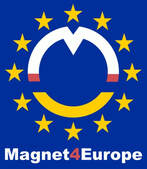|
Magnet4Europe, a 4 million Euro project funded by the European Commission, is the largest international implementation science project ever attempted to fundamentally change hospital work environments to improve clinician and patient wellbeing. Today the BMJ Open scientific journal published the scientific protocol for Magnet4Europe establishing its scientific and clinical significance. The project, involving a randomized trial in 130 hospitals in 7 countries, has prevailed over the pandemic. The grant supports the international partnership of some of the world’s leading Universities led by KU Leuven, Belgium and the University of Pennsylvania School of Nursing’s Center for Health Outcomes and Policy Research, USA. The Covid-19 pandemic exacerbated the dangerously high levels of physician and nurse burnout that predated and worsened during the pandemic and led to international alarm about an impending shortage of health professionals. “Burnout, depression, and fatigue are far too common among nurses and physicians in fast paced hospital settings, and suicide rates are alarming. Patient safety depends upon vigilance, quick thinking, and intense attention to detail by health professionals which is made more difficult by stressful work settings,” said Linda Aiken, PhD, RN, Magnet4Europe co-director and professor at the University of Pennsylvania School of Nursing. Burnout is an individual manifestation of organizational flaws rooted in systems as showed in the Magnet4Europe research protocol. Thus, Magnet4Europe seeks to transform organizations to create work environments that fully engage health professionals in implementing care that works for patients and providers by implementing an evidence-based intervention based on the successful Magnet Recognition Program®, a voluntary hospital designation for nursing care excellence by the American Nurses Credentialing Center. Research has shown that Magnet-recognized hospitals have lower health professional burnout and safer patient care. Sixty-five hospitals in six European countries (Belgium, England, Germany, Ireland, Sweden, and Norway) will receive a full-blown redesign of their workplaces-- supported by one-to-one twinning with an experienced U.S. Magnet recognized hospital and monthly international learning collaboratives to share best practices in workplace reform. The research protocol published today reveals a rigorous research evaluation that will determine the success of the initiative. Our research points to specific features of complex organizations,” adds Dr. Walter Sermeus, European coordinator of the initiative at KU Leuven, “that if modified can significantly improve the wellbeing of health professionals and patients alike. Magnet4Europe will translate these research findings into practice to expedite much needed workplace redesign in hospitals and other healthcare settings.” There are currently 591 Magnet Recognized hospitals, with most located in the US. Only two hospitals in Europe have achieved Magnet recognition. This initiative will test the feasibility and sustainability of the Magnet Model® for organizational redesign in the context of health care in Europe.
Find and download the Magnet4Europe’s study protocol here. Comments are closed.
|

